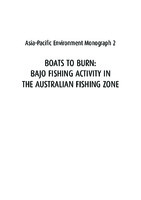Boats to Burn: Bajo Fishing Activity in the Australian Fishing Zone
Abstract
Under a Memorandum of Understanding between Indonesia and Australia, traditional Indonesian fishermen are permitted access to fish in a designated area inside the 200 nautical mile Australian Fishing Zone (AFZ). However, crew and vessels are regularly apprehended for illegal fishing activity outside the permitted areas and, after prosecution in Australian courts, their boats and equipment are destroyed and the fishermen repatriated to Indonesia. This is an ethnographic study of one group of Indonesian maritime people who operate in the AFZ. It concerns Bajo people who originate from villages in the Tukang Besi Islands, Southeast Sulawesi. It explores the social, cultural, economic and historic conditions which underpin Bajo sailing and fishing voyages in the AFZ. It also examines issues concerning Australian maritime expansion and Australian government policies, treatment and understanding of Bajo fishing. The study considers the concept of “traditional” fishing regulating access to the MOU area based on use of unchanging technology, and consequences arising from adherence to such a view of “traditional”; the effect of Australian maritime expansion on Bajo fishing activity; the effectiveness of policy in providing for fishing rights and stopping illegal activity, and why Bajo continue to fish in the AFZ despite a range of ongoing restrictions on their activity.
Keywords
australia; south east asia; legislation; fishery law; asia; ethnographic study; territorial waters; fishing; Ashmore and Cartier Islands; Indonesia; Proa; Shark; Steven O'Donnell (Australian actor)DOI
10.26530/OAPEN_458834OCN
225575865Publisher
ANU PressPublisher website
https://press.anu.edu.au/Publication date and place
Canberra, 2007Series
Asia-Pacific Environment Monograph, 2Classification
Ethnic studies
Fisheries and related industries
Legal history


 Download
Download Web Shop
Web Shop